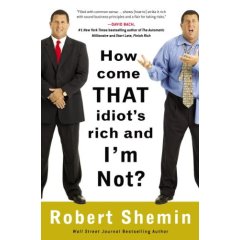I flew back from European business trip the other day and, as usual, did a bit of reading on the plane. One of the books I read was Robert Shemin's "How Come That Idiot's Rich And I'm Not?" This was a different sort of business book than I expected, from a few of perspectives.
First, the author introduces a lot of contrarian thinking about how to get rich - he firmly believes that conventional thinking about wealth and opportunity prevent most people from becoming wealthy. Second, he provides a lot of very specific steps to become financially successful. Third, he spends a lot of time on philosophy and your outlook on life, in an effort to help you get past preconceived notions about how to make money.
Here's the pitch...
 Initially I was a bit turned off by this book, because a lot of the book leads toward a methodology that Shemin offers on his web site and it felt a bit like a late night infomercial (Shemin's program centers around real estate investment schemes). As I read through it, I found myself taking a lot of ideas away that apply whether you use his system or not, and applicable even if you never get into real estate.
Initially I was a bit turned off by this book, because a lot of the book leads toward a methodology that Shemin offers on his web site and it felt a bit like a late night infomercial (Shemin's program centers around real estate investment schemes). As I read through it, I found myself taking a lot of ideas away that apply whether you use his system or not, and applicable even if you never get into real estate.
For example, there is a section I really liked about "Forgiving and Committing," which I think applies to many situations in life. Shemin even includes "Forgiveness Scripts" to help you learn to ask for forgiveness from friends, family members, and yourself. And don't think asking for forgiveness gets you off the hook - he is very clear that you're still accountable for your actions even if people forgive you for them.
The part about committing provides a clear and concise process to clarify goals and commit to them in an action-centric way. The concepts will be nothing new here, but Shemin's explanation is very easy to follow and will help you get through the fuzzy front end of deciding what you're committing to.
Relax - good things will happen
Another theme in the book relates to the power of positive thinking. Yes, the concept has been around pretty much forever, and has been reinvented in "The Secret", "The Power of Intention," and other books in recent years. In spite of this being an old concept, I find myself learning or identifying with the concept a bit better through each author's adaptation of this model -- and Shemin's take on it in this book is no exception. He has some great stories (some which sound to good to be true, and he acknowledges that in the text but insists they are absolutely true), detailing how various people's lives improved through positive imagery, keeping an open mind, and going out into the world to embrace success. I have seen enough examples of this in my own life to know there is something to it, and found this book's treatment of this concept to be very energizing.
On to the "doing"
The first half of the book is focused mostly on getting your head in a good place and getting to a point where you are able to look beyond some of your preconceived notions about success. In the second half, the author begins to take you into the details of how he has become independently wealthy (in spite of having a severe learning disability and being labeled as an "idiot" by at least one of his teachers, by the way).
The "doing" part of the book deals with how to save, how to invest, how to use credit responsibly, how to create meaningful objectives and action plans, and -- of course -- how to get into the real estate investment business. It's very well written, and quite intriguing.
Summary
As I mentioned early in this review, I enjoyed this book much more than I expected to. According to Shemin's thinking, the very reason I was inclined to write it off as an informercial is the very reason I'm not yet a Rich Idiot: I'm stuck in my "right side up" thinking and I need to turn my thinking upside down. We'll see how I do with that...
Read More


 I have adopted an approach that I call my "Daily Watch List," and I create a list of the things I really must get done today -- no matter what. At the beginning of the day (when things are quieter), I scan my various GTD context lists and identify the top few items (sometimes only 2 or 3, sometimes as many as 6 or 7) that will cause me pain if they don't get done today. I then write them on an index card that I put in my shirt pocket.
I have adopted an approach that I call my "Daily Watch List," and I create a list of the things I really must get done today -- no matter what. At the beginning of the day (when things are quieter), I scan my various GTD context lists and identify the top few items (sometimes only 2 or 3, sometimes as many as 6 or 7) that will cause me pain if they don't get done today. I then write them on an index card that I put in my shirt pocket. Be rational: Think before you act.
Be rational: Think before you act.